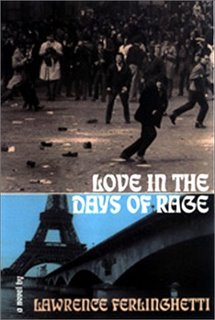some hypothetical notes
What I Would Say on an Anarchy & Religion Panel
1.) some leftist hostility toward religion and religious institutions doubtless emerges from historical cases in which these institutions were complicit in, or participated in, oppression and injustice.
2.) these cases aside, a more general anarchist denunciation of religion (i.e. resistance to religion "on principle") is tied to the emergence in the 17th-19th centuries of a belief in human reason and materialism, in opposition to the religious authority and divinely-sanctioned pedigrees of what was then a rapidly-collapsing Feudalism. the murky "mysticism" which had justified earlier, oppressive periods would finally be demolished through rational criticism, scientific materialism and the construction of an egalitarian world.
3.) but today, in the rain-shadow of the 20th century, many of these "Enlightenment narratives"—which unquestionably revolutionized and reorganized human societies—seem ethically bankrupt or, at least, suspect. supposedly rational, scientific systems have brought us massive bureaucracies capable of producing the Holocaust, arbitrary wars and mass prison complexes (Leninist world included); the development and proliferation of world-ending nuclear arms; and a technological spectacle with little connection to human needs that has pushed wild systems on this planet to the brink of collapse.
4.) the last fifty-odd years have seen uncertainty and skepticism toward these narratives emerge in all areas of human thought. from academic deconstructions of scientism that searches out positivistic "proof" of racist, sexist, genderfascist (etc) constructs (and demands they be "disproven" on its own terms), to poststructuralist investigations of how these discourses came into existence, to a more general "postmodern malaise" that permeates our culture and our sense of possibility, a sea change in our thinking & feeling is everywhere apparent.
4b.) you don't have to be Michel Focault to get these things either—just ask a wild-eyed Maoist to explain how the world works to you, and then reflect on why you're having that sketched-out, critical reaction.
5.) and so religion, which never really disappeared, returns on a number of fronts. while religious traditions undoubtedly make claims at a "meta narrative" similar to those emerging from the Enlightenment, the metaphysical nature of religious belief may ironically allow more space for interpretation, deconstruction and criticism of systemic thought than does the Western scientific and humanist tradition.
6.) hence, postmodern uncertainty in the ability of human reason to encapsulate, explain and master the material world finds a parallel in longstanding religious engagements with the apparent impossibility, yet characteristic desire, of human beings to comprehend ontological truth—be it God, Brahma, the origin and cessation of Suffering, whatever. hence the methods and sensibilities employed by people in religious contexts over the last, oh, three millennia could maybe inform our current existential conundrum.
7.) in particular, religious traditions have been dealing with the deconstructionist tendencies, which only recently appeared in currents of academic and critical thought, for a very long time. Mahayana Buddhism (one example) takes as primary the liberation of beings in a world of constructed appearances—one in which the assertion of thing-ness (read: fetishism, reification, alienation, etc) creates suffering and delusion—all the while acknowledging the absence of any "outside" or "objective" position from which to act or into which to escape. compared with the handful of decades that political theory has had to explore these ideas, Buddhism's twelve centuries offer a treasure trove of tools and sensibilities to help conceive of liberation today. ditto for more marginalized tendencies within Western religious traditions.
8.) in this sense religion doesn't have to be "defended" to anarchism. the challenge that anarchists face today is how to create a world of possibility & liberation when most attempts to systematize and implement those visions from Marx on down have failed or become hideously disfigured. in this situation, anarchists have a choice between searching out liberative techniques from all currents of social / ontological thinking—religion included—or to meet a complicated world of questions with knee-jerk explanations and programmatic notions of freedom. this is exactly we see coming from other political tendencies, from the ANSWER coalition to the Bush administration to the very fundamentalist networks which it claims to oppose.


